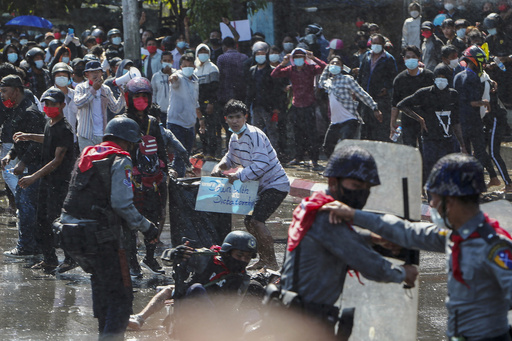Britain has introduced a comprehensive United Nations resolution on Myanmar, pushing for renewed peace efforts, condemning attacks on civilians – particularly by the Myanmar military – and advocating for a cessation of illicit arms transfers. The resolution, disclosed on Tuesday, expresses deep concern over the escalating violence in Myanmar, where a civil war persists between the military-led regime and resistance groups. It emphasizes the need for unimpeded humanitarian access on a significant scale, highlighting worries about the deteriorating humanitarian crisis and restrictions hindering aid delivery, leading to increased food insecurity.
The draft resolution warns that the current situation in Myanmar could worsen discrimination, ethnically driven violence, violations of international humanitarian law, human rights violations, and conflict-related sexual violence. Following the military’s seizure of power on February 1, 2021, from the elected government of Aung San Suu Kyi, who remains detained along with members of her political party, public dissent escalated into armed resistance and a full-blown civil conflict.
The opposition against the military regime is now predominantly led by ethnic minority militias and people’s defense forces who align with the primary opposition and have gained control over vast territories through intense fighting in recent times. The resolution underscores the significant role of the Association of Southeast Asian Nations in facilitating dialogue and ending violence, although Myanmar’s military leaders have thus far rejected the bloc’s peace initiatives from 2021.
Recognizing the criticality of engagement from relevant stakeholders, the draft resolution urges the ASEAN special envoy to Myanmar, Alounkeo Kittikhoun, and the new U.N. special envoy, Julie Bishop, to pursue efforts for a peaceful and inclusive resolution to the Myanmar crisis. Negotiations within the Security Council regarding the draft resolution are expected to be challenging, as demonstrated by the previous resolution on Myanmar approved in December 2022, which faced opposition from Russia, China, and India, citing ties to the Myanmar regime.
The proposed resolution demands the full execution of the December 2022 resolution, which called for an immediate cessation of violence in Myanmar, the release of all arbitrarily detained individuals, including Suu Kyi, and the restoration of democratic institutions. It also calls upon opposing factions in the country to engage in dialogue, reconciliation, and to uphold human rights, fundamental freedoms, and the rule of law.
